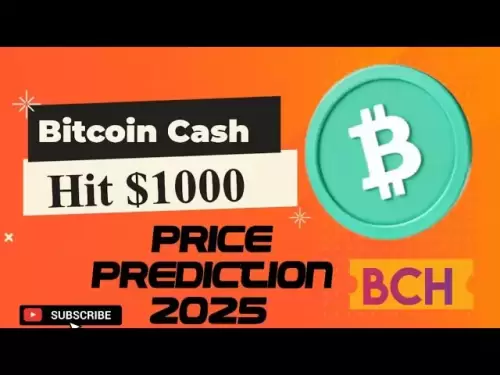 |
|
 |
|
 |
|
 |
|
 |
|
 |
|
 |
|
 |
|
 |
|
 |
|
 |
|
 |
|
 |
|
 |
|
 |
|
Cryptocurrency News Articles
The Outrageous Idea of Buying a $300,000 Home with Just 1 Pi Coin
Jun 12, 2025 at 08:25 pm
But that’s exactly what some in the Pi Network community are proposing, following the network’s full Open Mainnet launch on February 20, 2025.

The idea of buying a house with one Pi Coin for a Global Consensus Value (GCV) of $314,159 sounds like science fiction. But in an ecosystem where belief is actively used to build utility, and every stakeholder contributes to an integrated whole, it's a concept that has moved from theory into practice.
Following the full Open Mainnet launch of Pi Network on February 20, some members of the community are suggesting that a house could be bought for one Pi Coin.
This scenario was sparked by a crypto analyst, Mr Spock, who took to X, formerly Twitter, to explain how real estate could work in the Pi Network ecosystem.
"Selling a House for 1 Pi Coin at $314,159? Here's How Real Estate Could Work in the Pi Network Ecosystem. On February 20, 2025, Pi Network officially launched its Open Mainnet, transforming Pi from a closed test phase into a live digital currency with real utility. Now the teams are building the financial and legal institutions that will enable a flourishing Pi economy. As part of this effort, several legal teams are working on setting up Real Estate Trusts (RETs) to manage and invest in real estate assets. These RETs will provide a framework for collective ownership and investment opportunities in the real estate market. In addition to the legal and financial aspects, the Global Consensus Value (GCV) of Pi plays a crucial role in the real estate domain. While it's common knowledge that a used Model 3 is valued at 2 Pi Coins, according to GCV, a buyer might offer 1 Pi Coin for a house. However, a seller would likely only accept if they knew they could spend that one Pi Coin on something of equal value (e.g., another house, cash, or goods) without needing to convert it. For instance, a seller might prefer to use that one Pi Coin to buy a car, pay several contractors, invest in a real estate project, or purchase land or gold from businesses that accept Pi. They might also decide to keep some as a long-term asset. As long as all of this happens in the Pi ecosystem without cash being involved, the GCV value stays in place. But if the seller wants cash, the deal falls apart. They might ask for 500 Pi to cover losses from converting to fiat, or reject the offer entirely. Once definitive money enters the picture, the whole GCV model breaks down. For GCV to work, Pi needs a strong internal economy where people can buy and sell real things, cars, services, and property, using only Pi. And that's already starting. In the U.S., some car dealers like Cube Motor and real estate firms like Zito Realty are accepting Pi. Several builders, property developers, and tech teams are working on fractional ownership, construction loans, and entire Pi Real Estate Trusts (PRTs). Those early adopters serve as proof that the concept can work if the ecosystem keeps growing. Of course, an offer of 1 Pi Coin for a $314,159 home sounds preposterous. It defies conventional logic. Yet that doubt hasn't stopped people from lining up to participate. For many in the Pi community, the coin is not a speculative token but the foundation of a new kind of economy, one that provides real-world goods, services, and financial infrastructure. At the end of the day, skeptics may call the idea "dumb" or label it sci-fi fantasy. But in an ecosystem where belief is actively used to build utility, and where every stakeholder contributes to an integrated whole, the idea of buying a house with a single Pi Coin has already moved from theory into practice. #PiChain #PiNetwork #Cryptocurrency #RealEstate #DEFI #GlobalConsensusValue"
This was a hot topic of conversation within the community, with many noting that the Global Consensus Value (GCV) of Pi is commonly understood to be around $314,159, while a used Model 3 is valued at 2 Pi Coins.
A buyer may offer 1 Pi Coin for a home based on GCV, but a seller would likely only agree if they knew they could spend that one Pi Coin on things of equal value, without needing to convert it to fiat.
The seller may prefer to use that one Pi Coin to buy a car, pay several contractors, invest in a real estate project, or purchase land or gold from businesses that accept Pi. They might also decide to keep some as a long-term asset.
As long as all of this happens within the Pi ecosystem and no cash is involved, the GCV value stays in place. But if the seller wants cash, the deal falls apart.
The seller might ask for 500 Pi to cover losses from converting to fiat, or they might reject the offer entirely.
Once definitive money enters the picture, the whole
Disclaimer:info@kdj.com
The information provided is not trading advice. kdj.com does not assume any responsibility for any investments made based on the information provided in this article. Cryptocurrencies are highly volatile and it is highly recommended that you invest with caution after thorough research!
If you believe that the content used on this website infringes your copyright, please contact us immediately (info@kdj.com) and we will delete it promptly.





























































